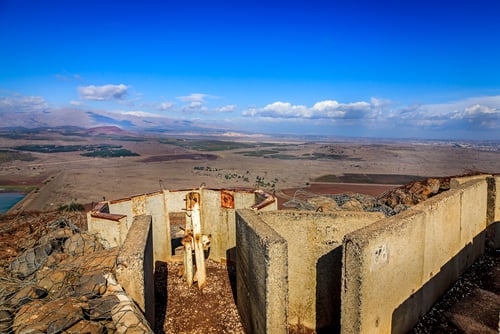Of Bental and Bullets

It is hot, and I’ve already drained half my water. I should have rationed it out more carefully, but reason had yielded to need. Samuel, my guide, wearing sandals and a gray, wide-brimmed hat, appears unaffected; the uphill grind is easy for him. He shares a bit of his family history. His grandparents had escaped the reach of the Reich and made a home in England, and Samuel had found love and peace in Israel. He is expecting his first child.
Nearing the summit of Mount Bental in the Golan Heights, we pass three Humvees. Ahead of us, a troop of IDF soldiers march upward, their weapons in open view. It is a reminder of how volatile the Middle East is. I return my gaze to Samuel. A question forms on the tip of my tongue.
The ground shakes and a deafening wave rumbles over us. My question immediately changes.
“What was that?”
Samuel pauses.
“The Syrian Civil War,” comes his solemn reply.
Stunned, I just stare at him. He turns away and continues the trek up the mountain. I will my feet to continue onward, my mind swirls with the reality of what the war would look like. Would I be able to see it? The horrors?
Another explosion quickens my pace. I catch up to Samuel and match his long strides. The weight of the war deadens the physical discomfort of the hike. My mouth dry, I take another gulp of water.
“You should conserve that,” Ofir, our assigned security guard, says. He is a former IDF medic. He carries a pistol on his hip, yet another reminder. The Israeli is a few years younger than me, and one look into his dark eyes shows me he had seen and experienced things he wished he hadn’t. Admirably, he fights for joy in every moment, smiles often, and hopes to tour southern Asia after he had saved up enough. His eye is set on the beauty of Vietnam.
Taking his advice, I snap the bladder hose back onto my backpack and continue the climb. The wide path levels out as we near the top. One hundred meters ahead, cut into the earth, an Israeli lookout post remains from a war fought decades ago. Yossi, our driver, waits at the base of the mountain. He had fought in that war. He drove an armored personnel carrier in the Yom Kippur War. In fact, just about everyone I had met thus far had fought in one war or another.
“Who are they?” I ask, referring to the two uniformed men standing at the edge of the lookout. Samuel follows my gaze.
“They are from the UN, keeping an eye on things,” he replies.
Samuel stops, and we look out over the Valley of Tears, Quneitra, New Quneitra, and the sprawling, bleak desert. An Israeli community, known as a kibbutz, resides in the valley, its green farmland in stark contrast to the Syrian sand. Quneitra, a small town controlled by Al Qaeda, sits on the other side of the border, and New Quneitra, a larger city controlled by Syrian President Bashar al-Assad’s forces, looms just north, not twenty miles.
The quick rat-ta-tat-tat of machine gun fire rises from the desert cities. The only things we can’t hear are the screams of men, women, and children who no doubt perish. My imagination fills in the gap.
Samuel begins about the Six-Day War and the Yom Kippur War, but another explosion interrupts him. He apologizes, visibly shaken. A plume of smoke rises in the distance.
“Is it always like this?” I ask. Samuel shakes his head.
“No,” he replies. He takes a minute, asks if he should continue. I nod, and he does. I try to listen, but the gunfire steals my attention. I’m drawn to the desert, to help in some way, knowing I can’t.
“Take some time to look around,” Samuel says. Did he finish? My mouth is dry again. I go for a drink. Nothing. Did I drink it all? I can’t remember, lost as I am in the tragedy before me. My water is gone, as is my hope for their future.